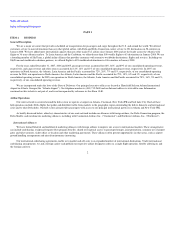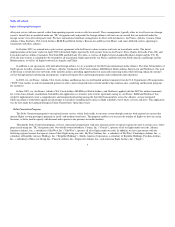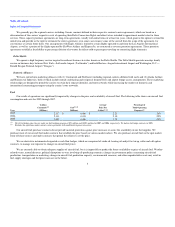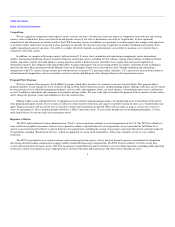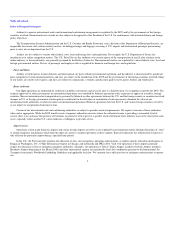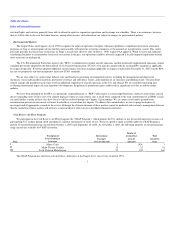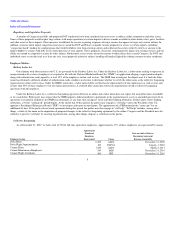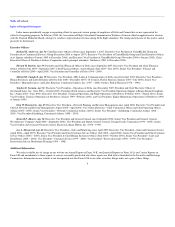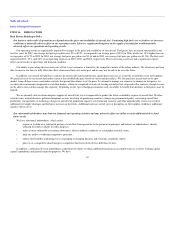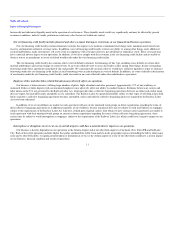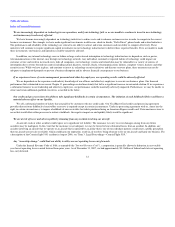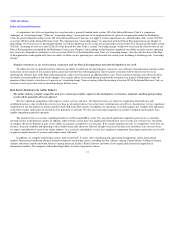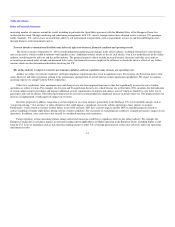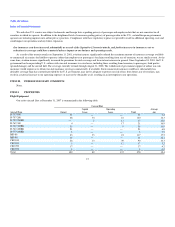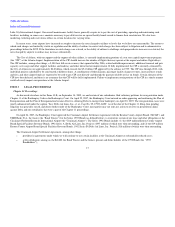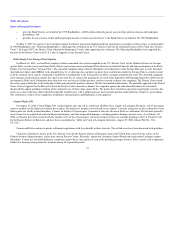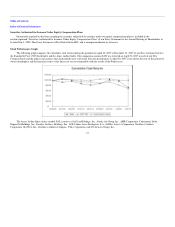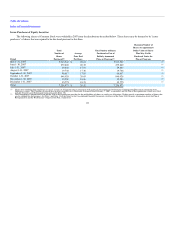Delta Airlines 2007 Annual Report Download - page 17
Download and view the complete annual report
Please find page 17 of the 2007 Delta Airlines annual report below. You can navigate through the pages in the report by either clicking on the pages listed below, or by using the keyword search tool below to find specific information within the annual report.
Table of Contents
Index to Financial Statements
We are increasingly dependent on technology in our operations, and if our technology fails or we are unable to continue to invest in new technology,
our business may be adversely affected.
We have become increasingly dependent on technology initiatives to reduce costs and to enhance customer service in order to compete in the current
business environment. For example, we have made significant investments in delta.com, check-in kiosks, "Delta Direct" phone banks and related initiatives.
The performance and reliability of the technology are critical to our ability to attract and retain customers and our ability to compete effectively. These
initiatives will continue to require significant capital investments in our technology infrastructure to deliver these expected benefits. If we are unable to make
these investments, our business and operations could be negatively affected.
In addition, any internal technology error or failure or large scale external interruption in technology infrastructure we depend on, such as power,
telecommunications or the internet, may disrupt our technology network. Any individual, sustained or repeated failure of technology could impact our
customer service and result in increased costs. Like all companies, our technology systems and related data may be vulnerable to a variety of sources of
interruption due to events beyond our control, including natural disasters, terrorist attacks, telecommunications failures, computer viruses, hackers and other
security issues. While we have in place, and continue to invest in, technology security initiatives and disaster recovery plans, these measures may not be
adequate or implemented properly to prevent a business disruption and its adverse financial consequences to our business.
If we experience losses of senior management personnel and other key employees, our operating results could be adversely affected.
We are dependent on the experience and industry knowledge of our officers and other key employees to execute our business plans. Our financial
performance that culminated in our recent Chapter 11 proceedings created uncertainty that led to a significant increase in unwanted attrition. If we experience
a substantial turnover in our leadership and other key employees, our performance could be materially adversely impacted. Furthermore, we may be unable to
attract and retain additional qualified executives as needed in the future.
Our credit card processors have the ability to take significant holdbacks in certain circumstances. The initiation of such holdbacks likely would have a
material adverse effect on our liquidity.
We sell a substantial number of tickets that are paid for by customers who use credit cards. Our Visa/MasterCard credit card processing agreement
provides that no future holdback of receivables or reserve is required except in certain circumstances. Under its processing agreement with us, Amex has the
right, in certain circumstances, to impose a holdback of our receivables for tickets purchased using an American Express credit card. If circumstances were to
occur that would allow either processor to initiate a holdback, the negative impact on our liquidity likely would be significant.
We are at risk of losses and adverse publicity stemming from any accident involving our aircraft.
An aircraft crash or other accident could expose us to significant tort liability. The insurance we carry to cover damages arising from any future
accidents may be inadequate. In the event that the insurance is not adequate, we may be forced to bear substantial losses from an accident. In addition, any
accident involving an aircraft that we operate or an aircraft that is operated by an airline that is one of our codeshare partners could create a public perception
that our aircraft are not safe or reliable, which could harm our reputation, result in air travelers being reluctant to fly on our aircraft and harm our business. For
a description of the Comair flight 5191 accident in August 2006, see "Item 3. Legal Proceedings—Comair Flight 5191."
Any "ownership change" could limit our ability to utilize our net operating losses carryforwards.
Under the Internal Revenue Code of 1986, as amended (the "Internal Revenue Code"), a corporation is generally allowed a deduction in any taxable
year for net operating losses carried forward from prior years. As of December 31, 2007, we had approximately $9.1 billion of federal and state net operating
loss carryforwards.
12


